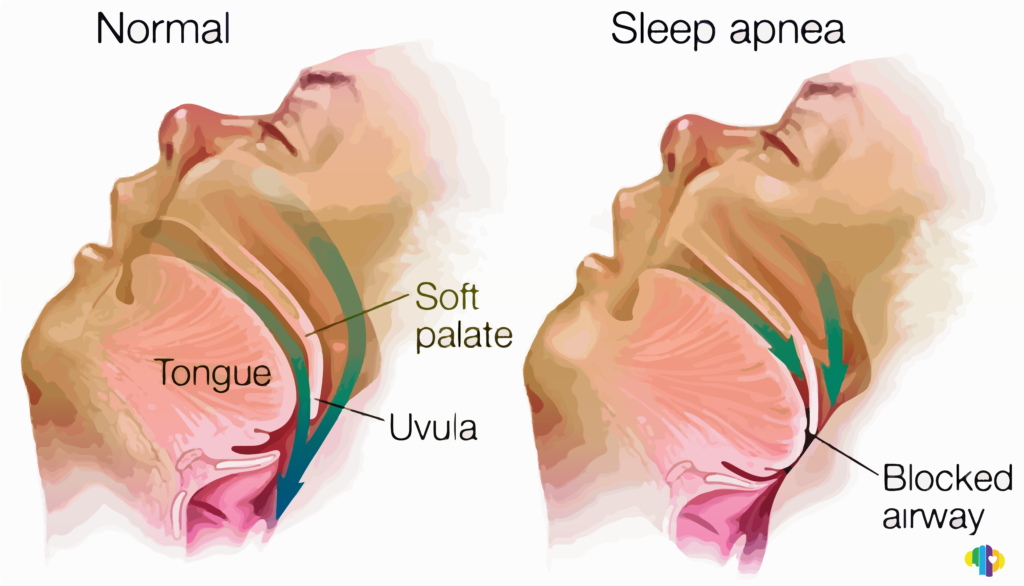Sleep Apnea is difficult to live with. You may wake up tired and groggy every morning, and struggle to get through an entire day. When it comes to bedtime, you may feel relieved to throw yourself into your bed, but your condition may wake you up repeatedly, and you may not get the rest you need. This may not only affect your physical health and wellbeing, but it can also affect your mental health.
Sleep Apnea and the Brain
This condition also affects the brain in a variety of ways. Along with causing fatigue, difficulty focusing, and irritability, it impacts brain function. This affects your daily life, making it difficult to perform simple daily tasks, difficulty thinking, and leading to memory problems.
There are two chemicals associated with sleep apnea, glutamate, and gamma-aminobutyric acid (GABA). They are found in the brain region known as the insula, this is responsible for regulating emotions, monitoring blood pressure and temperature, and assisting with rational thoughts. Glutamate is tied to your response to stress, helping you respond to environmental threats, while GABA is a mood inhibitor, and helps keep you calm.

Individuals with sleep apnea have extremely elevated levels of glutamate, and much lower levels of GABA. When glutamate levels are high, you may experience a lot of stress, and the brain does not function well. The low GABA levels make it difficult to relax, recharge and rest. This suggests that the brain function changes with sleep apnea and getting treatment for sleeping disorders as soon as possible will help your brain to function normally.
Sleep Apnea and Mental Health
Sleep apnea may also influence mental health, and those who have the condition have a much higher risk of anxiety, depression, panic disorder, bipolar disorder, or even schizophrenia.
It is not surprising that sleep apnea can be responsible for anxiety. Waking up repeatedly throughout the night feeling as though you are choking or cannot breathe causes a stress response in your body and brain. This can become a conditioned reaction and go on to affect many other areas of your life. Daytime drowsiness, along with irritability, may lead to problems at work, difficulty focusing, and relationship stresses.
Depression and sleep apnea are also linked. Individuals with depression often report trouble sleeping, and insomnia is usually one of the common symptoms of depression. In fact, many other symptoms of sleep apnea, such as daytime exhaustion, fatigue, poor focus, moodiness, and weight gain, are also signs of depression. Treating it can lower the symptoms of depression, and if you still have problems with mood after you have begun treatment, you may need to seek treatment for your mental health.
Sleep apnea has been tied to schizophrenia. The condition changes your brain, so it is no surprise you may develop another brain related disorder. Individuals with schizophrenia are six times more likely to have sleep apnea, and just like depression, sleep apnea and schizophrenia share similar symptoms, such as mood swings and daytime drowsiness.
Psychological Effects of Sleep Deprivation
To function effectively, most individuals need to get a minimum of eight hours sleep. Those suffering with sleep apnea, often feel unrested, even after getting a full night’s sleep. If the sleep apnea is left untreated, the person may begin to hallucinate and see or hear things that are not there. Along with hallucinations, sleep deprivation can cause a variety of psychological issues, including:
- Depression
- Anxiety
- Stress
- Paranoia
- Impulsive behaviours
- PTSD
- Suicidal thoughts
If you have been diagnosed with sleep apnea, there are some things you can try to do to help.
These may even be all you need if your condition is mild.
- Try losing weight if you are overweight
- Sleep on your side, you can buy a specific pillow or bed wedge to keep you on your side
- Do not smoke
- Try to not drink too much alcohol, especially before going to sleep
- Unless recommended by your doctor, do not take sleeping pills as this can worsen symptoms
- Treat allergies
Causes
Sleep apnea happens if your airways become too narrow whilst you sleep. This stops you from breathing properly.
Sleep apnea has been linked to:
- Having a large neck
- Obesity
- Being older than forty – although children and young adults can also get it
- Having family members with the condition
- Smoking and drinking alcohol
- Having large tonsils or adenoids
- Sleeping on your back

When to see a doctor
If an individual has problems with excessive daytime sleepiness, they should see their doctor. They should also see their doctor if someone has witnessed them frequently stop breathing whilst they sleep.
Sleep apnea can be profoundly serious. When a person stops breathing, the heart must work overtime to pump blood through the body to provide oxygen. This extra work may damage the heart and lead to heart rhythm problems and high blood pressure.
Usually, this condition is treated by a doctor, by having the individual wear a device known as a Continuous Positive Airway Pressure (CPAP) machine. The machine fits over the nose or mouth and provides extra positive airway pressure to stop the airways collapsing whilst the person sleeps.
Doctors may consider surgery to treat sleep apnea, especially in children with enlarged tonsils and adenoids. A doctor can decide to remove these to improve airflow.
In conclusion, there are self-help techniques as well as medical assistance you can get for your sleep apnea. If you believe you may have the condition, you should get an appointment with your GP as soon as possible to receive the best treatment.
Delaying your treatment can result in worsening symptoms and cause other health complications, therefore it is so important to seek medical advice if you have or think you have the condition.
There are treatments available that can make the condition much easier to live with, and your medical professional will provide you with all the advice and help you may need.



